Today, a scientific advisory committee of the U.S. Food and Drug Administration (FDA) advanced R.J. Reynolds Tobacco Co.’s efforts to communicate reduced-risk information to consumers regarding its Camel Snus products.
The Tobacco Products Scientific Advisory Committee (TPSAC) recognized that the available science supports that switching completely from cigarettes to Camel Snus can significantly reduce smokers’ risk of lung cancer and respiratory disease, although the committee was evenly divided on claims regarding oral cancer and heart disease.
The TPSAC also recognized that switching to snus means less risk for smokers of cigarettes and that no smoke equals less risk. The TPSAC reviewed all information in the proposed advertising and provided the company and the FDA with important issues to consider as the evaluation of the Camel Snus modified risk tobacco product (MRTP) applications continues.
“We appreciate the committee’s thoughtful and robust discussion of the specific language that should appear in modified-risk advertising for Camel Snus and are pleased it agrees with some of our proposed messages,” said James Figlar, executive vice president of research and development of R.J. Reynolds.
“The committee’s insight should be of great value to the FDA, and we look forward to working with the FDA as it evaluates our applications.”
To date, the FDA has not issued an MRTP marketing order. The FDA will take the TPSAC’s recommendation into consideration as it independently evaluates and makes a determination based on its own review.
“Pursuing modified-risk claims like we have for Camel Snus and developing a wide range of potentially reduced-risk product choices for adult tobacco consumers demonstrates our commitment to transform tobacco,” Figlar said.
“We believe the FDA authorizing our ability to communicate reduced-risk information to smokers would be a scientifically sound step toward reducing the harm caused by cigarettes and is consistent with the FDA’s vision to put in place a comprehensive regulatory framework based on tobacco harm reduction.”
The Tobacco Control Act prohibits manufacturers from communicating to consumers that any particular product presents less risk than another tobacco product without first obtaining an MRTP marketing order from the FDA.
The MRTP applications relate to R.J. Reynolds’ six styles of Camel Snus and were submitted in March 2017. The company submitted over 450,000 pages of data and extensive scientific research to the FDA, including research relying on epidemiology for U.S. smokeless tobacco use and Swedish snus use.
According to the U.S. Surgeon General, combustible tobacco products by far have the greatest adverse impact on public health. Camel Snus is a smokeless tobacco product made of heat-treated ground tobacco contained in pouches and has been on the market since 2006.
Snus review moves forward

